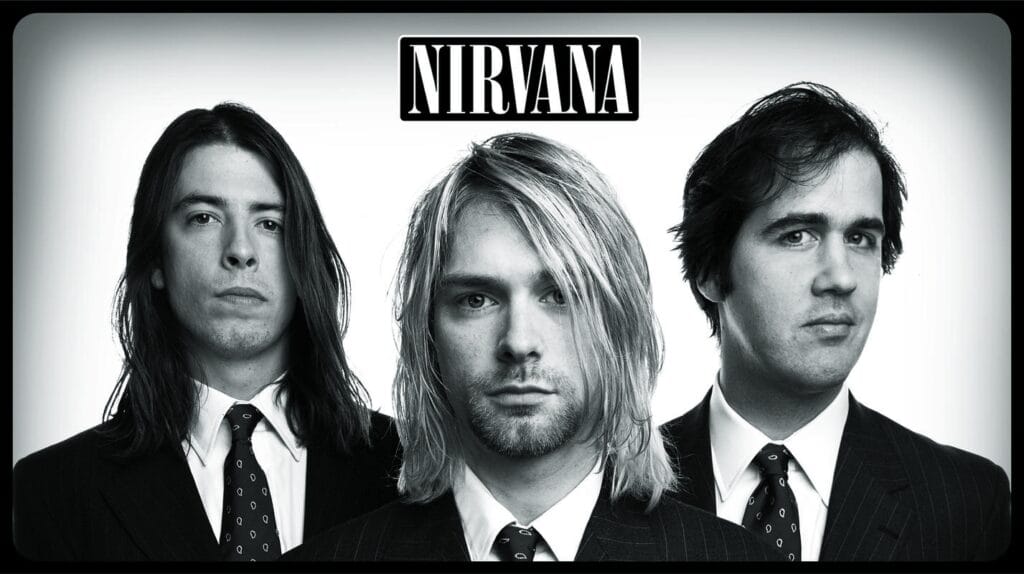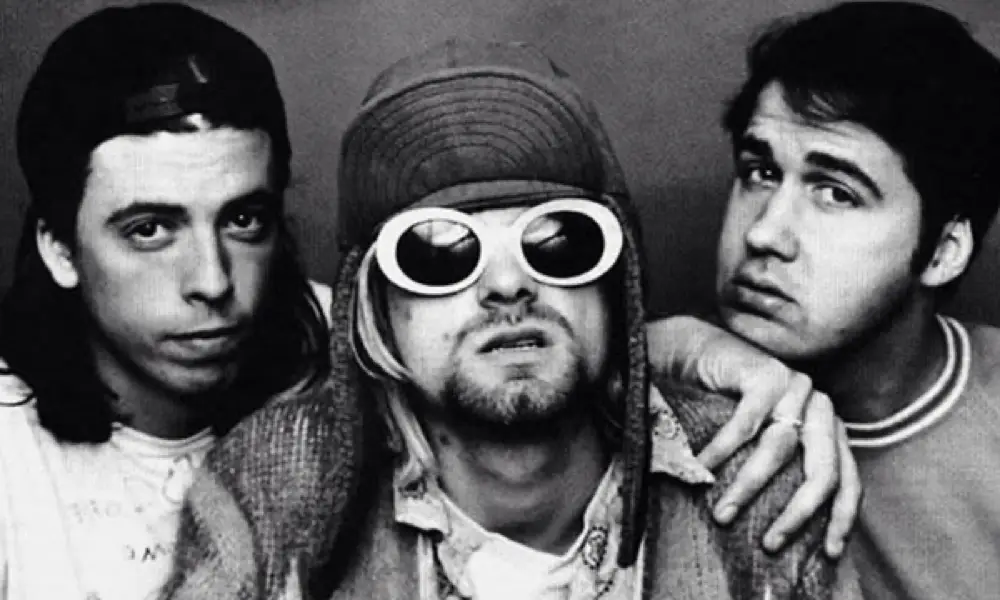Nirvana, a name synonymous with the grunge music scene of the early 1990s, has left an indelible mark on both the genre and the broader spectrum of rock music. Formed in Aberdeen, Washington in 1987, the band was primarily composed of Kurt Cobain, the enigmatic lead vocalist and guitarist, Krist Novoselic on bass, and Dave Grohl, who would later join as the drummer. Their fusion of angst-driven lyrics and raw, edgy instrumentation created a sonic landscape that epitomized the grunge movement.

From their humble beginnings to achieving worldwide fame, Nirvana’s journey was meteoric. With the release of their groundbreaking album “Nevermind” in 1991, which featured the iconic track “Smells Like Teen Spirit,” the band catapulted to global stardom almost overnight. This album’s unexpected success helped to introduce grunge music to a broader audience, forever altering the panorama of rock music. Nirvana’s brief but incandescent career was tragically cut short with the untimely death of Cobain in 1994, yet their legacy continues to impact musicians and fans alike.
Nirvana’s discography, though limited to a few studio albums, offers a rich tapestry of sound that has been meticulously analyzed and cherished by music aficionados. This blog post aims to take a lighthearted yet insightful look into their body of work, ranking their albums from “worst” to best. It’s important to note that even their “worst” album holds significant value and is pivotal in their musical journey. Join us as we delve into the world of Nirvana, exploring each album’s unique contribution to the legacy that continues to resonate through the annals of rock history.
From the Muddy Banks: Bleach
Nirvana’s debut album, Bleach, holds a unique place in the pantheon of rock history and the grunge movement. Released in 1989, Bleach introduced the world to Nirvana’s raw, unfiltered sound, laying the groundwork for the seismic shift the band would later induce in the music industry. Though this album may rank lowest on our list, it is by no means a record to overlook. On the contrary, Bleach is essential listening for any true fan eager to understand the genesis of the band’s evolving identity.
When Bleach hit the airwaves, the world was not prepared for the grungy, distorted riffs and Kurt Cobain’s visceral vocal performance. The album’s production quality, often critiqued for being less polished, arguably adds to its unrefined charm. The lo-fi aesthetic captures the essence of a fledgling band finding their voice. Tracks like “About a Girl” and “Blew” highlight Cobain’s burgeoning songwriting prowess, foreshadowing the brilliance that was yet to come.
The album’s rawness is both its strength and its Achilles’ heel. While later Nirvana albums would benefit from more sophisticated production techniques, Bleach‘s gritty sound provides a window into the band’s early, unvarnished state. It showcases a Nirvana that is earnest and unabashedly authentic, qualities that would become integral to their identity.
Despite its lower ranking in Nirvana’s discography, Bleach is a must-listen, not merely as an artifact of rock history, but for its sheer energy and unpretentious spontaneity. It is an album that asks listeners to embrace imperfection and find beauty in the chaos—much like the very ethos of grunge itself. For those who wish to delve deeper into the roots of what made Nirvana a touchstone for a generation, Bleach offers an unvarnished glimpse into the band’s nascent genius.
The Raw Essence: Incesticide
Released in 1992, Incesticide stands as a distinctive compilation in Nirvana’s discography, offering an eclectic mix of B-sides, rarities, and outtakes that span the band’s early years. This assemblage of tracks presents listeners with an unfiltered and raw essence of Nirvana, serving as a bridge between the coarser sounds of Bleach and the polished chaos of Nevermind. While some may argue it ranks lower in the grand scheme, Incesticide retains a unique charm that elevates it above Bleach.
At its core, Incesticide is a candid look into Nirvana’s less mainstream material. The album plunges into deeper, sometimes murkier, waters of the band’s creative psyche. From the frenzied energy of “Dive” to the melancholic undertones of “Aneurysm,” listeners are treated to a raw yet compelling narrative of Kurt Cobain’s multifaceted artistry. Tracks like “Hairspray Queen” and “Mexican Seafood” showcase some of the band’s more experimental ventures, leading to moments that feel anything but conventional rock fare. It’s these very quirks that add an element of humor and unpredictability, making the album a truly memorable listen, if not just for its oddities.
Dedicated fans of Nirvana will find Incesticide a treasure trove of the band’s early sound, a time capsule that encapsulates their grunge roots. This compilation doesn’t shy away from the raw and the unpolished, instead, it revels in it, inviting listeners to appreciate the imperfections that made Nirvana an emblem of the grunge movement. Tracks like “Sliver” and “Stain” are quintessential grunge anthems that highlight Cobain’s knack for combining abrasive riffs with unexpectedly poignant lyrics.
Although Incesticide occupies a niche corner of Nirvana’s rich catalog, it provides a comprehensive glimpse into the band’s artistry beyond their major commercial successes. It’s an album that invites everyone, from casual listeners to grunge aficionados, to experience the less adorned but equally captivating side of Nirvana.
The Rich Textures: MTV Unplugged in New York
‘MTV Unplugged in New York’ occupies a unique place in Nirvana’s discography, presenting an intimate and acoustic side that sharply contrasts with the band’s typical grunge-driven sound. Released in 1994, this live album captures a performance from November 18, 1993, where Nirvana took to the stage of Sony Music Studios in New York City, stripping back their electrifying rock anthems to deliver hauntingly beautiful acoustic renditions.
What truly sets ‘MTV Unplugged in New York’ apart is its carefully curated tracklist that mixes familiar hits with lesser-known gems and covers. The album opens with “About a Girl,” a subtle yet powerful rendition that immediately signals a departure from their harder edge, allowing Kurt Cobain’s raw vocals to take center stage. Tracks like “Come As You Are” and “All Apologies” are rendered with an emotional depth that resonates deeply, showcasing the band’s versatility and Cobain’s complex artistry.
The emotive performances throughout the album offer a glimpse into the vulnerabilities of Nirvana, portraying a side of the band that is rarely seen in their mainstream rock albums. Noteworthy is the cover of David Bowie’s “The Man Who Sold the World,” which has since become iconic in its own right, reflecting Nirvana’s ability to reinterpret and breathe new life into existing works. Similarly, the inclusion of “Where Did You Sleep Last Night,” a chilling rendition of the Lead Belly classic, stands as a testament to Cobain’s tremendous vocal intensity and interpretive skills.
The contrast between the gentle, acoustic arrangements of ‘MTV Unplugged in New York’ and the relentless energy of Nirvana’s studio albums emphasizes the band’s eclectic range. This work not only solidifies their place in rock music history but also offers an intimate portrait of the band—stripped down and unplugged, yet profoundly impactful. The album has since gained an iconic status, celebrated for its raw authenticity and the emotional gravity of its performances.
The Herald of Change: In Utero
‘In Utero,’ released in 1993, remains a striking testament to Nirvana’s raw and uncompromising spirit. As the band’s final studio album before the tragic loss of Kurt Cobain, it crystallizes the evolution of the band’s sound into something unfiltered and starkly genuine. Diverging from the mainstream appeal of its predecessor, ‘Nevermind,’ this album boldly embraced a grungier and more abrasive sonic texture that both critics and fans found refreshing and, at times, startling.
Produced by Steve Albini, ‘In Utero’ is celebrated for its sonic unrefinement and visceral honesty, pulling listeners into a turbulent, emotional journey. Tracks like ‘Serve the Servants’ and ‘Scentless Apprentice’ demonstrate Nirvana’s raw power and willingness to confront discomforting themes. These aggressive titles are a far cry from the polished production of earlier albums, mirroring Kurt Cobain’s own struggles and inner turmoil.
However, ‘In Utero’ is not without its moments of melodic introspection. ‘Heart-Shaped Box,’ with its hauntingly beautiful structure, and ‘All Apologies,’ a melancholic yet harmonious ballad, showcase the band’s versatility. These songs create a mesmerizing contrast against the backdrop of the album’s more raucous offerings, underscoring the complex duality of Nirvana’s musical identity. Such dichotomy elucidates the multifaceted talent of Kurt Cobain, revealing the delicate balance between aggression and melodic finesse that lies at the core of their music.
The critical acclaim ‘In Utero’ received post-release highlights its influential role in rock history. Critics revered it as an unyielding artistic statement, celebrating both its defiant nature and emotional depth. The album’s raw authenticity and divergence from commercial expectations ensure its enduring legacy. ‘In Utero’ remains a poignant reminder of Nirvana’s unique position within the grunge movement and the indelible mark they left on rock music.
The Revolution Begins: Nevermind
Nirvana’s “Nevermind” isn’t just another album; it’s a seismic event that redefined the music landscape. As the title suggests, this album was the tipping point where rock and grunge music converged, creating an era-defining sound that spoke to a disenchanted generation. “Smells Like Teen Spirit” served as an anthem, catapulting Nirvana onto radios worldwide and into the annals of music history.
Among the many hits on “Nevermind,” tracks like “In Bloom,” “Come as You Are,” and “Lithium” not only topped charts but also resonated with listeners on a deeply personal level. With Kurt Cobain at the helm, his raw, emotion-filled vocals paired perfectly with the brooding, distorted guitar riffs that have become synonymous with grunge music. It’s impossible to overstate the album’s influence; it laid the groundwork for what rock music would become in the 1990s and beyond.
The production of “Nevermind” was notable for its near-perfect execution, despite the raw, unpolished nature of the music itself. Butch Vig’s production allowed every element—from the pounding drums of Dave Grohl to Krist Novoselic’s driving basslines—to shine. It was a polished masterpiece hiding behind a tattered flannel shirt, perfectly embodying the ethos of grunge.
Amidst all the acclaim and adoration, there’s also a sense of humor to be found in “Nevermind.” The album cover features a naked baby underwater, reaching for a dollar bill—a cheeky metaphor that’s become iconic in its own right. This blend of serious musical innovation and subtle irreverence only adds to its charm and lasting appeal.
So, whether you’re listening to it for the umpteenth time or discovering it anew, “Nevermind” continues to be a cornerstone of not just Nirvana’s discography, but of rock music as a whole. Its impact reverberates through the years, proving that Kurt Cobain and his bandmates struck upon something truly timeless.
The Undisputed Champion: With the Lights Out
Among Nirvana’s illustrious discography, the posthumous box set With the Lights Out is heralded as a true testament to the band’s unparalleled genius. Released in 2004, this expansive compilation uncovers a treasure trove of previously unreleased tracks, rarities, and demos that paint a vivid portrait of Nirvana’s creative journey. Fans and critics alike have found themselves entranced by the sheer depth and authenticity of the material, making it a monumental addition to the band’s legacy.
The box set spans three audio CDs and one DVD, showcasing over 81 tracks that span the full breadth of Nirvana’s career. From early home recordings to unforgettable live performances, With the Lights Out offers listeners an all-access pass into the raw and unfiltered world of Kurt Cobain and his bandmates. It’s not just a collection of songs; rather, it serves as an audio diary that details the evolution of a band that redefined rock music.
One of the remarkable aspects of this release is the insight it provides into Nirvana’s creative process. Listening to the progression of tracks, one can almost feel the sparks of innovation that led to their iconic sound. Whether it’s hearing Cobain’s acoustic demos or discovering alternate versions of beloved classics, every note feels like a revelation. The boxed set also includes a DVD that features rare footage and home videos, offering a visual journey that complements the audio experience.
What makes With the Lights Out resonate so powerfully with fans is its authenticity. It captures the very essence of what made Nirvana so revolutionary — their unpolished brilliance, their raw emotion, and their relentless pursuit of artistic expression. This collection cements Nirvana’s position not just as a band, but as a cultural phenomenon that continues to inspire new generations of rock enthusiasts.
In an ever-evolving musical landscape, With the Lights Out remains an enduring reminder of Nirvana’s indelible impact. For those looking to delve deep into the heart and soul of one of the most influential bands in rock history, this box set is nothing short of essential. It’s no wonder it stands as the undisputed champion in our ranking of Nirvana’s albums.

The Lasting Legacy
Nirvana’s impact on music and pop culture is unequivocal and enduring. Each of their albums, whether celebrated or critiqued, has contributed uniquely to the band’s monumental legend. “Bleach” laid the gritty groundwork, showcasing the raw grunge sound that would later define the genre. “Nevermind” not only catapulted Nirvana into global stardom but also brought alternative rock into the mainstream, changing the musical landscape forever. “In Utero” pushed boundaries with its unapologetic honesty and relentless intensity, cementing Kurt Cobain’s status as a genius troubled artist.
These records, regardless of their ranking, demonstrate the band’s versatility and depth. Nirvana’s music is characterized by its potent blend of anguished lyrics, distortion-heavy guitar riffs, and a rebellious spirit that resonated with a generation seeking authenticity. Cobain’s poignant lyrics and emotive performances encapsulated the complexities of human emotion, striking a chord with millions. Dave Grohl’s explosive drumming and Krist Novoselic’s solid bass lines added layers of dynamism to the band’s sound, making each album a distinctive piece of the grunge movement.

Despite the band’s relatively short tenure, Nirvana’s influence on rock history is undeniable. Their music continues to be a vital part of the rock canon, inspiring new artists and bands across genres. The raw emotion and authenticity in their work have a timeless quality that reaches beyond the confines of the era in which it was created. It’s a testament to Cobain, Grohl, and Novoselic’s unparalleled ability to create music that resonates across generations. New listeners continually discover the cathartic power of Nirvana’s albums, ensuring that the spirit of grunge remains alive and well.
In a world where music trends come and go, Nirvana’s albums stand as a testament to the enduring power of genuine expression and innovative artistry.









